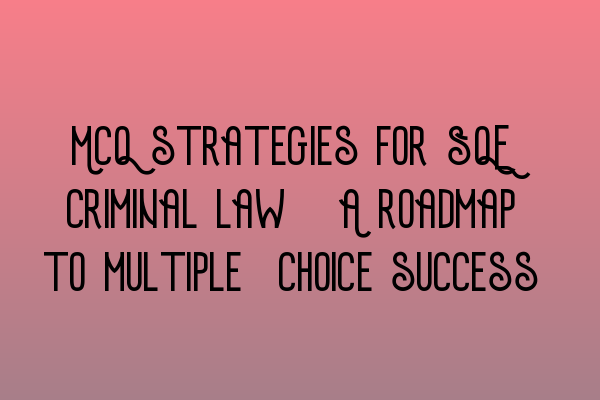MCQ Strategies for SQE Criminal Law: A Roadmap to Multiple-Choice Success
Welcome to the SQE Criminal Law blog at SQE Criminal Law & Practice Law UK! In this article, we will explore key strategies for success in tackling multiple-choice questions (MCQs) in the SQE Criminal Law exam. MCQs require a specific approach to ensure accurate and efficient answering, and understanding these strategies will significantly boost your chances of achieving a high score.
Understanding the Exam Structure
Before diving into the strategies, let’s briefly review the exam structure. The SQE Criminal Law exam consists of a series of MCQs designed to assess your knowledge and understanding of criminal law principles, statutes, and case law. It is essential to familiarize yourself with the exam format, time allocation, and scoring criteria to effectively plan your approach.
1. Read the Question Stem Carefully
When faced with an MCQ, start by reading the question stem carefully. This initial step is crucial in understanding what is being asked. Pay attention to important keywords, such as “not,” “except,” or “only,” as they can significantly impact the correct answer choice. Take your time to comprehend the question fully before proceeding.
2. Identify Key Concepts
Once you understand the question stem, identify the key concepts being tested. Often, MCQs will focus on specific legal principles, elements of offenses, or relevant case law. Identify and underline these key concepts to ensure you remain focused during the answer selection process.
3. Eliminate Obviously Wrong Choices
When faced with multiple answer choices, eliminate those that are obviously incorrect. This technique enhances your odds of selecting the correct answer by narrowing down the options. Carefully analyze each choice, comparing it to your understanding of the law and the concepts identified in the previous step.
4. Consider the Most Complete Answer Choice
In some instances, multiple answer choices may appear correct. In such cases, consider the most complete answer choice that addresses all aspects of the question. Avoid selecting ambiguous or incomplete responses as they are less likely to be the correct choice. Aim for the answer choice that covers all relevant legal considerations.
5. Manage Your Time Effectively
Time management is crucial in any MCQ test. Pace yourself and allocate appropriate time for each question. If you encounter a particularly challenging question, make a note and come back to it later. Prioritize questions that you can answer confidently, ensuring you maximize your overall score within the given time frame.
6. Practice, Practice, Practice!
As with any exam, preparation is key. Engage in regular MCQ practice to familiarize yourself with the question styles and enhance your legal knowledge. Take advantage of our SQE 1 Practice Exam Questions and SQE 1 Practice Mocks FLK1 FLK2 resources to reinforce your understanding of criminal law concepts.
Further SQE Preparation Resources
Looking for additional resources to help you prepare for the SQE Criminal Law exam? Check out our comprehensive SQE 2 Preparation Courses and SQE 1 Preparation Courses designed to provide you with the essential knowledge and skills needed to succeed.
Stay Updated on Exam Dates
Stay up to date on the latest SRA SQE exam dates to properly plan your study schedule and ensure you have ample time to review and revise before the big day.
Conclusion
Mastering MCQ strategies is an essential part of achieving success in the SQE Criminal Law exam. By carefully analyzing question stems, identifying key concepts, and practicing regularly, you will develop the necessary skills to tackle MCQs with confidence. Remember to manage your time effectively and utilize resources such as practice exams and preparation courses to enhance your chances of achieving a high score. Good luck!
